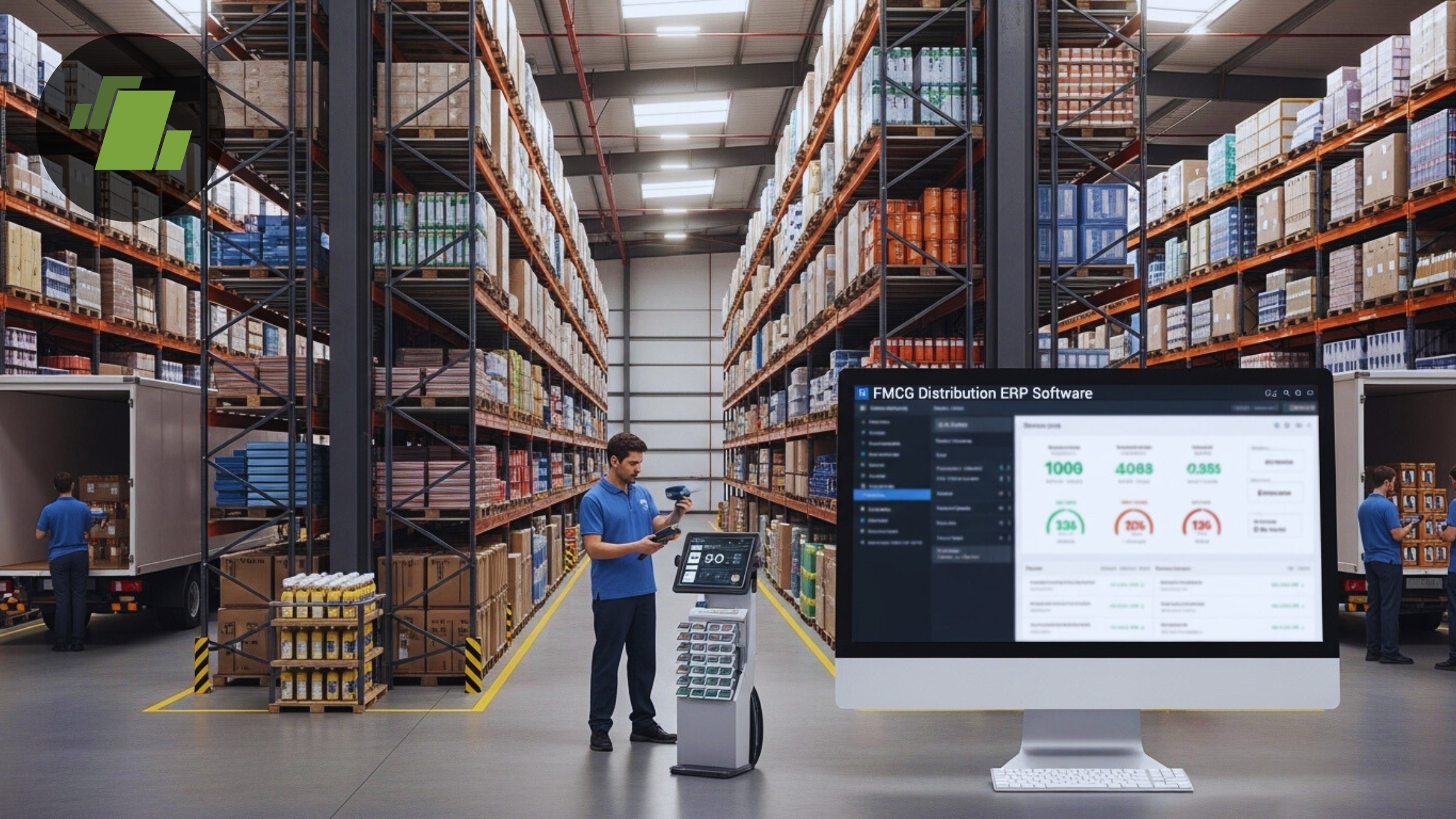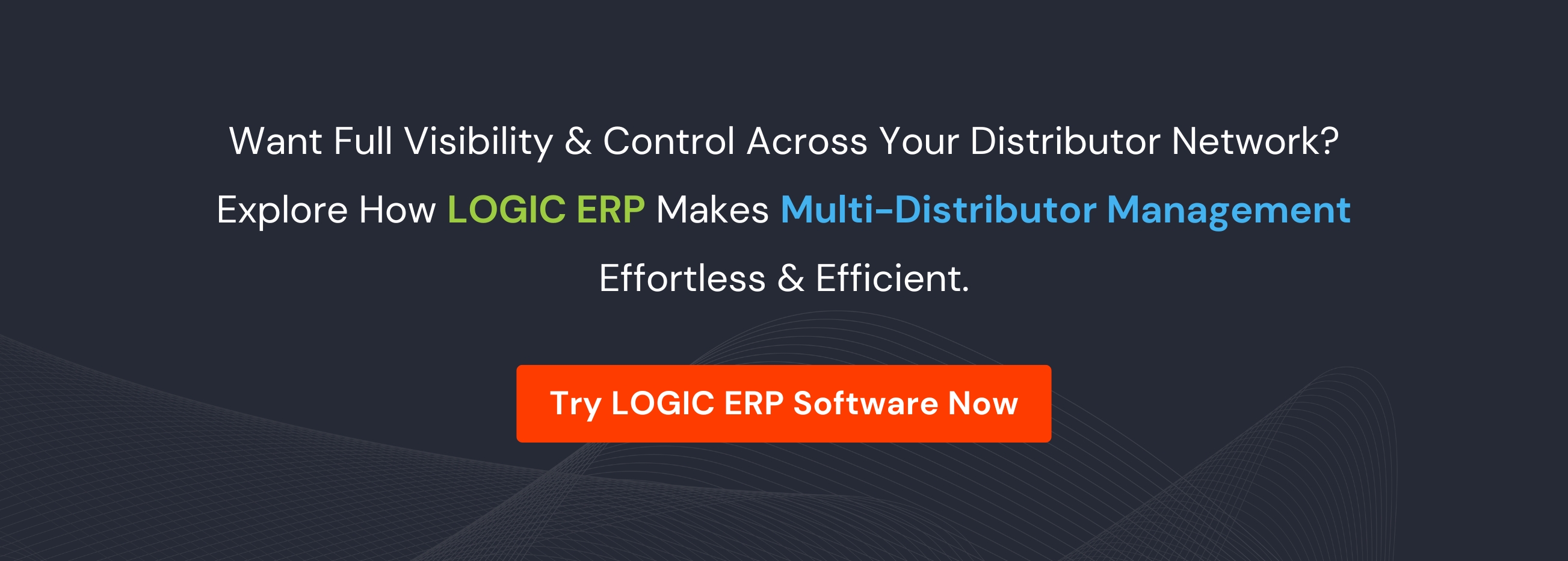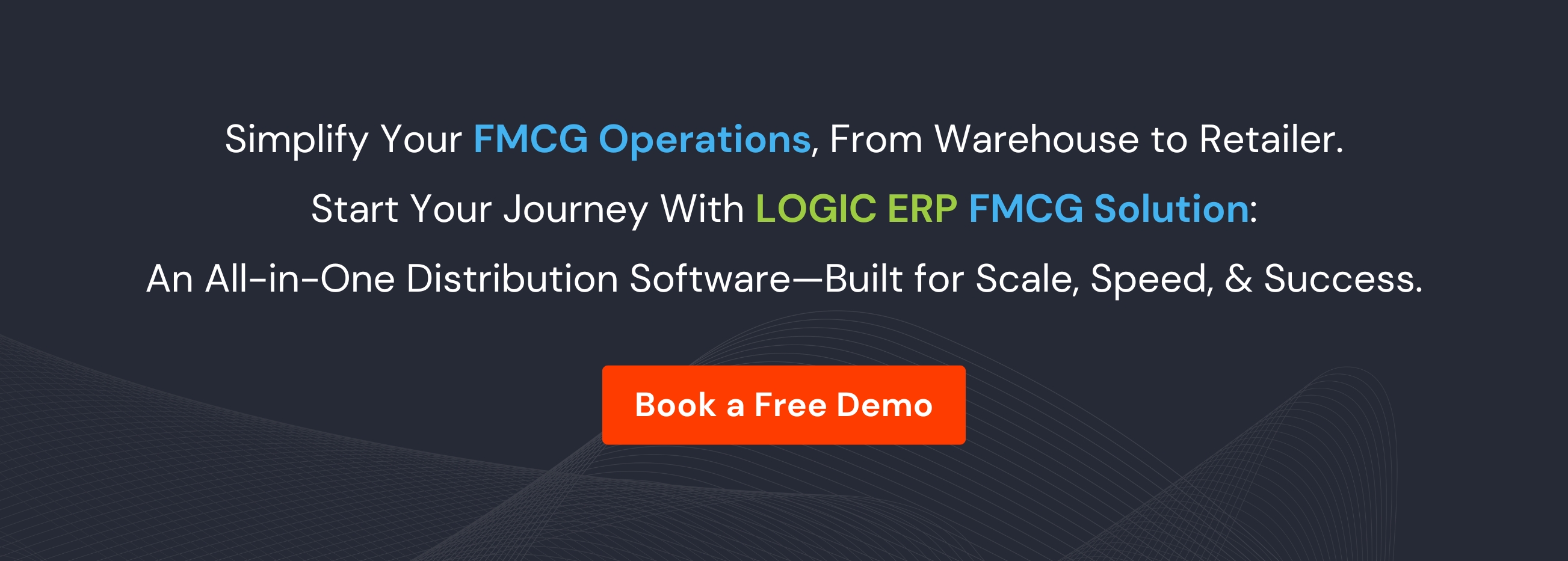Multi-Distributor Management Made Simple with FMCG Distribution ERP Software


Summary
FMCG Distribution ERP software revolutionizes multi-distributor management with automation, real-time visibility, and centralized control. It streamlines wholesale billing, optimizes inventory, and automates GST compliance. Businesses benefit from reduced operational costs, enhanced distributor coordination, and intelligent demand forecasting. LOGIC ERP ensures seamless integration, faster order processing, and mobile-first access for a future-ready FMCG ecosystem.
Key Takeaways
- FMCG distribution software automates order processing, invoicing, and supply chain workflows for efficient distributor management.
- Real-time inventory tracking using multi-location inventory management ERP improves stock visibility and control.
- A centralized ERP system for FMCG simplifies operations across multiple distributors from one unified dashboard.
- Automated wholesale billing software reduces operational costs by 40–50% and enhances billing accuracy.
- AI-powered demand forecasting helps improve inventory optimization, reducing stockouts and overstocking.
- Mobile ERP solutions for FMCG enable field sales teams and distributors to access critical data on the go.
- Real-time analytics and automated GST billing ensure compliance and support strategic, data-driven decisions.
Introduction
Managing multiple distributors in the Fast-Moving Consumer Goods (FMCG) industry has become increasingly complex in 2025. With growing market demands, evolving consumer preferences, and intricate supply chain networks, businesses need robust solutions to streamline their distribution operations. FMCG Distribution ERP software has emerged as an all-in-one solution that transforms multi-distributor management from a challenging endeavor into a simplified, automated process.
Understanding Multi-Distributor Management Challenges in FMCG
The FMCG industry faces unique operational challenges when managing multiple distributors across different regions and markets. Demand volatility poses significant challenges, affecting inventory levels and operational planning, while complex supply chain networks require managing multi-faceted operations with numerous stakeholders.
Key Challenges Include:
- Inventory Management Complexity: Managing stock levels across multiple distributors while avoiding stockouts or overstocking requires real-time visibility and automated reordering processes. Without proper systems, businesses struggle with inefficient inventory allocation and poor demand forecasting.
- Supply Chain Visibility Issues: Coordinating with multiple distributors without centralized visibility creates blind spots in the supply chain. This leads to delays, miscommunication, and inability to respond quickly to market changes.
- Financial Management Across Distributors: Handling invoicing, payments, GST compliance, and financial reporting across multiple distributor relationships becomes overwhelming without automated systems.
- Performance Monitoring Difficulties: Tracking distributor performance, sales metrics, and market penetration across different regions requires sophisticated reporting and analytics capabilities.
How FMCG Distribution ERP Software Transforms Multi-Distributor Management
Modern ERP software for FMCG industry addresses these challenges through integrated, automated solutions that streamline every aspect of distributor management. Advanced FMCG distribution ERP software simplifies supply chains and boosts efficiency through features like automated billing, expiry tracking, and GST returns.
Core Benefits of FMCG Distribution ERP Systems:
- Centralized Distributor Management: A comprehensive distribution management software provides a single platform to manage all distributor relationships, contracts, performance metrics, and communications. This centralization eliminates data silos and ensures consistent information across all channels.
- Real-Time Inventory Visibility: Advanced inventory management ERP capabilities provide real-time stock visibility across all distributors, enabling better demand planning, automatic reordering, and optimal stock allocation based on regional demand patterns.
- Automated Financial Processes: Integrated wholesale billing software automates invoicing, payment tracking, GST compliance, and financial reporting across all distributor relationships, reducing manual errors and improving cash flow management.
- Enhanced Supply Chain Coordination Supply chain management software features enable seamless coordination between manufacturers, distributors, and retailers, providing end-to-end visibility and control over the entire distribution network.
LOGIC ERP: Leading the FMCG Distribution Revolution
LOGIC ERP stands out as a premier FMCG ERP solution specifically designed for the Indian market’s unique requirements. LOGIC ERP offers top features including inventory management, automated invoicing, supply chain optimization, and GST compliance that make it the preferred choice for FMCG businesses managing multiple distributors.
Key Features of LOGIC ERP for Multi-Distributor Management:
- Advanced Distributor Portal: LOGIC ERP provides dedicated distributor portals where partners can access real-time inventory information, place orders, track shipments, and manage their accounts independently. This self-service capability reduces administrative overhead while improving distributor satisfaction.
- Multi-Location Inventory Management: The system tracks inventory across multiple warehouses and distributor locations, providing real-time visibility into stock levels, movement patterns, and reorder requirements. This ensures optimal inventory allocation and prevents stockouts.
- Automated Order Processing: From order receipt to dispatch, LOGIC ERP automates the entire order processing workflow, including order validation, inventory checking, automatic invoicing, and shipment scheduling across multiple distributors.
- Comprehensive Reporting and Analytics: Built-in business intelligence modules provide detailed insights into distributor performance, sales trends, inventory turnover, and market penetration, enabling data-driven decision-making for distributor management.
- GST and Compliance Management: LOGIC ERP ensures complete GST compliance across all distributor transactions, automatically generating required returns and maintaining audit trails for regulatory compliance.
Implementation Strategy for Multi-Distributor Management
Successfully implementing FMCG distribution software requires a structured approach that addresses both technical and operational aspects of distributor management.
Phase 1: System Setup and Configuration
- Distributor Onboarding Configure distributor profiles with complete business information, credit limits, pricing structures, and territory mappings. LOGIC ERP’s flexible configuration allows customization based on specific distributor requirements and business models.
- Inventory Setup Establish inventory parameters including minimum stock levels, reorder points, lead times, and allocation rules for each distributor location. This ensures optimal inventory management from day one.
- Financial Integration Configure billing cycles, payment terms, credit management, and accounting integration to streamline financial processes across all distributor relationships.
Phase 2: Process Automation and Workflow Design
- Order-to-Cash Automation Implement automated workflows that handle order processing, inventory allocation, invoicing, and payment tracking across multiple distributors simultaneously.
- Performance Monitoring Systems Set up automated reporting and alert systems that monitor distributor performance, inventory levels, and sales metrics, enabling proactive management of distributor relationships.
- Communication Channels Establish automated communication systems for order confirmations, shipping notifications, inventory alerts, and promotional updates to keep all distributors informed and engaged.
Advanced Features for Modern FMCG Distribution
Today’s distribution ERP software incorporates cutting-edge technologies to address evolving market demands and operational challenges.
AI-Powered Demand Forecasting
AI-driven modules are transforming the FMCG landscape by offering predictive analytics, automated customer support, and personalized solutions. LOGIC ERP leverages artificial intelligence to analyze historical sales data, market trends, and seasonal patterns to provide accurate demand forecasts for each distributor territory.
Mobile-First Distributor Experience
Modern distributors expect mobile-enabled solutions that allow them to manage their business on-the-go. LOGIC ERP provides comprehensive mobile applications that enable distributors to place orders, check inventory, track shipments, and access reports from anywhere.
Real-Time Analytics and Dashboards
Interactive dashboards provide real-time visibility into key performance indicators across all distributors, including sales performance, inventory turnover, payment status, and market penetration metrics.
Integration Capabilities
- E-commerce Integration Seamless integration with online marketplaces and e-commerce platforms ensures consistent inventory and pricing across all sales channels.
- Third-Party Logistics Integration Integration with logistics providers enables automated shipment tracking, delivery confirmations, and freight management across the distribution network.
- Banking and Payment Gateway Integration Direct integration with banking systems and payment gateways streamlines financial transactions and improves cash flow management.
ROI and Business Impact of FMCG Distribution ERP
Implementing comprehensive FMCG ERP software delivers measurable returns on investment through operational efficiency improvements and cost reductions.
Quantifiable Benefits:
- Inventory Optimization Companies typically achieve reduction in inventory holding costs through better demand forecasting and automated reordering processes.
- Operational Efficiency Automation of manual processes reduces administrative overhead, allowing teams to focus on strategic activities and relationship management.
- Improved Cash Flow Automated invoicing and payment tracking improve cash collection cycles, enhancing overall financial performance.
- Enhanced Distributor Satisfaction Self-service portals and automated processes improve distributor satisfaction scores, leading to stronger partnerships and increased sales.
Best Practices for Multi-Distributor Management Success
Standardize Processes Across Distributors
Implement consistent processes for order management, inventory handling, and performance measurement across all distributor relationships. This standardization simplifies management while ensuring quality and consistency.
Establish Clear Performance Metrics
Define and monitor key performance indicators (KPIs) for each distributor, including sales targets, inventory turnover, payment compliance, and customer satisfaction metrics.
Regular Training and Support
Provide ongoing training and support to distributors on system usage, new features, and best practices. Well-trained distributors are more likely to fully utilize the system’s capabilities.
Continuous Process Improvement
Regularly review and optimize distributor management processes based on performance data and feedback. The flexibility of modern ERP systems allows for continuous refinement and improvement.
Future Trends in FMCG Distribution Technology
The FMCG distribution landscape continues to evolve with emerging technologies and changing market dynamics.
Emerging Technologies:
Internet of Things (IoT) Integration IoT sensors and devices provide real-time visibility into inventory conditions, transportation parameters, and storage environments across the distribution network.
Blockchain for Supply Chain Transparency Blockchain technology ensures complete traceability and transparency across the supply chain, from manufacturer to end consumer.
Advanced Analytics and Machine Learning Enhanced analytics capabilities provide deeper insights into consumer behavior, market trends, and operational optimization opportunities.
Conclusion: Simplifying Multi-Distributor Management with LOGIC ERP
Managing multiple distributors in the FMCG industry doesn’t have to be complex and overwhelming. With the right FMCG distribution ERP software i.e. LOGIC ERP, businesses can transform their distributor management operations into streamlined, efficient, and profitable processes.
LOGIC ERP’s comprehensive suite of features, including automated billing, real-time inventory management, GST compliance, and advanced analytics, provides everything needed to successfully manage multiple distributor relationships. The system’s flexibility, scalability, and user-friendly interface make it the ideal choice for FMCG businesses looking to simplify their distribution operations while driving growth and profitability.
By implementing LOGIC ERP, companies can achieve better distributor relationships, improved operational efficiency, enhanced financial performance, and stronger market presence. The future of FMCG distribution management is here, and it’s simpler than ever with the right technology partner.
Ready to transform your multi-distributor management operations? Contact LOGIC ERP today to learn how our comprehensive FMCG distribution software can simplify your business processes and drive sustainable growth.
Call our Experts for ERP demo at +91-73411-41176 or send us an email at sales@logicerp.com today!
Frequently Asked Questions
Q1: What is FMCG Distribution ERP Software and how does it help manage multiple distributors?
A: FMCG Distribution ERP Software is a comprehensive business management system specifically designed for Fast-Moving Consumer Goods companies to manage their entire distribution network from a single platform. It helps manage multiple distributors by providing centralized control over inventory, automated order processing, real-time distributor performance tracking, and streamlined financial management across all distributor relationships.
Q2: How does LOGIC ERP differ from other distribution management software solutions?
A: LOGIC ERP stands out as a premier FMCG ERP solution with features specifically designed for the Indian market, including automated GST compliance, multi-language support, and local regulatory requirements. Unlike generic distribution management software, LOGIC ERP offers dedicated distributor portals, automated expiry tracking, batch management, and comprehensive wholesale billing software capabilities tailored for FMCG operations.
Q3: What are the key benefits of implementing inventory management ERP for FMCG businesses?
A: Inventory management ERP systems provide real-time stock visibility across multiple locations, automated reordering based on demand patterns, reduced carrying costs by 20-30%, prevention of stockouts and overstocking, and optimized inventory allocation. This leads to improved cash flow, better distributor satisfaction, and enhanced operational efficiency across the entire distribution network.
Q4: How does supply chain management software improve distributor relationships?
A: Supply chain management software enhances distributor relationships through self-service portals, automated order processing, real-time shipment tracking, transparent communication channels, and performance-based incentive management. Distributors gain access to real-time inventory information, automated invoicing, and mobile applications for on-the-go business management, resulting in 30-40% improvement in distributor satisfaction scores.
Q5: Can FMCG ERP software handle GST compliance and financial management for multiple distributors?
A: Yes, modern FMCG ERP software automatically handles GST compliance across all distributor transactions, generates required returns, maintains audit trails, and streamlines financial processes including invoicing, payment tracking, and accounting integration. This ensures complete regulatory compliance while reducing manual errors and administrative overhead by 40-50%.
Q6: What ROI can businesses expect from implementing distribution ERP software?
A: Businesses typically achieve significant ROI through distribution ERP software implementation, including 20-30% reduction in inventory costs, 40-50% decrease in administrative overhead, 25-35% improvement in cash collection cycles, and enhanced distributor performance. Most companies see complete ROI within 12-18 months of implementation.
Q7: How does ERP software for FMCG industry support mobile and remote distributor management?
A: Modern ERP software for FMCG industry provides comprehensive mobile applications enabling distributors to place orders, check inventory levels, track shipments, access reports, and manage accounts from anywhere. This mobile-first approach improves distributor engagement, reduces response times, and enables real-time business operations across geographically distributed networks.
Q8: What implementation timeline should businesses expect for FMCG distribution software?
A: FMCG distribution software implementation typically takes 3-6 months depending on business complexity, number of distributors, and customization requirements. The process includes system configuration, data migration, distributor onboarding, staff training, and phased rollout to ensure smooth transition and minimal business disruption.
Q9: How does automated billing software integrate with existing business processes?
A: Wholesale billing software within FMCG ERP systems seamlessly integrates with existing accounting systems, bank platforms, and e-commerce channels. It automates invoice generation, payment processing, credit management, and financial reporting while maintaining data consistency across all business processes and distributor relationships.
Q10: What future trends should businesses consider when selecting distribution management software?
A: Key future trends in distribution management software include AI-powered demand forecasting, IoT integration for real-time tracking, blockchain for supply chain transparency, advanced analytics for predictive insights, and enhanced mobile capabilities. Businesses should select scalable solutions like LOGIC ERP that can adapt to these emerging technologies and evolving market requirements.




